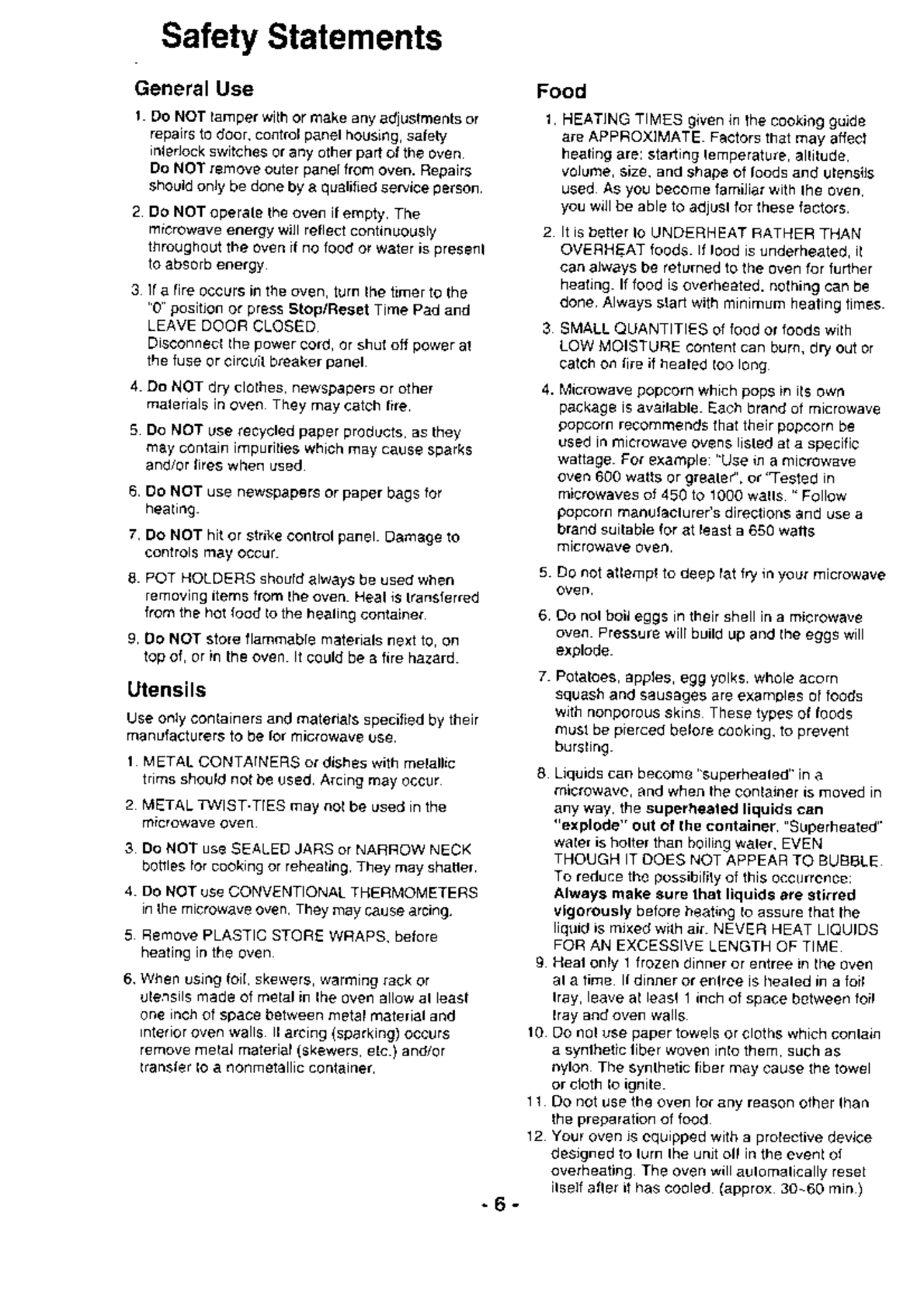
Safety
$tatement$
L.
:
:. :
General
Use
1,
Do NOT
tamper
with
or make
any
adjustments
or
repairs
to
door, control
panelhousing,
safety
interlock
switches
or
any
other
part
of the
oven.
Do NOT
remove
outer
panelfrom
oven.
Repairs
should
only
be done
by a
qualified
service
person.
2. Do
NOT
operate
the
oven if
empty.
The
microwave
energy will reflect
continuously
throughout
the
oven if no food
or water
is
present
to
absorb
energy.
3. lf
a fire
occurs in the
oven, turn
the timer
to the
"0"
position
or
press
Stop/Reset
Time
Pad
and
LEAVE
DOOR
CLOSED.
Disconnect
the
power
cord,
or
shut
off
oower
al
the fuse
or
circuit breaker
panel.
4.
Do NOT
dry
clothes, newspapers
or other
materials
in
oven. They
may
catch fire.
5. Do NOT
use
recycled
paper
products,
as they
may
contain
impurities
which
may
cause
sparks
andlor fires
when
used.
6. Do
NOT use newspapers
or
paper
bags
for
heating.
7.
Do NOT
hit
or strike
control
panel.
Damage
to
controls may
occur.
8.
POT
HOLDERS
should
always
be used when
removing
items
from
the
oven.
Heat is
transferred
from
the hot food
to
the heating
container.
9. Do NOT
store
flammable
materials
next
to, on
top
of, or
in
the
oven. lt
could
be a fire hazard.
Utensils
Use only
containers
and
materials
specified
by their
manufacturers
to be
for
microwave
use.
1.
METAL
CONTAINERS
or dishes
with metailic
trims
should
not be
used. Arcing
may
occur.
2. METAL
TWIST-TIES
mav
not
be
used
in the
microwave
oven.
3. Do NOT
use
SEALED JARS
or
NARROW
NECK
bottles for
cooking
or
reheating.
They
may
shatter.
4.
Do NOT
use CONVENTIONAL
THERMOMETERS
in the microwave
oven.
They
may
cause arcing.
5. Remove
PLASTIC
STORE
WRAPS,
before
heating in
the
oven.
6. When
using foil, skewers,
warming
rack
or
utensils made
of
metal
in
the
oven
allow at least
one inch
of space between
metal
materialand
interior
oven
walls. lf
arcing
(sparking)
occurs
remove
metal material
(skewers,
etc.)
and/or
transfer to
a nonmetallic
container.
Food
1. HEATING TIMES
given
in
the
cooking
guide
are
APPROXIMATE.
Factors
that may
affect
heating
are:
starting temperature,
altitude,
volume,
size,
and
shape of foods
and
utensils
used. As
you
become
familiar
with the
oven,
you
will be able
to
adjust for
these
factors.
2.
lt is
better to
UNDERHEAT
RATHER
THAN
OVERHEAT foods.
lf food
is
underheated,
it
can always
be returned
to the
oven
for fudher
heating.
lf
food is
overheated,
nothing
can be
done.
Always
start with
minimum
heating times.
3. SMALL
QUANTITIES
of food
or foods with
LOW MOISTURE
content
can
burn,
dry out
or
catch
on
fire
if
heated
too long.
4. Microwave
popcorn
which
pops
in
its
own
package
is
available.
Each
brand
of microwave
popcorn
recommends
that their
popcorn
be
used
in microwave
ovens
listed
at a
specific
wattage. For
example:
"Use
in
a microwave
oven 600
watts
or
greate/',
or'Tested
in
microwaves
of 450
to 1000
watts.
"
Follow
popcorn
manufacturer's
directions
and
use a
brand
suitable
lor at least
a
650 watts
microwave
oven.
5. Do
not
attempt
to deep fat
fry in
your
microwave
oven.
6. Do
not
boil eggs
in their
shell in
a microwave
oven.
Pressure
will
build
up and the
eggs
will
explode.
7. Potatoes,
apples,
egg
yolks,
whole
acorn
squash
and
sausages
are examples
of foods
with
nonporous
skins. These
types
of foods
must
be
pierced
before
cooking,
to
prevent
bursting.
8. Liquids
can become
"superheated"
in
a
microwave,
and when
the container
is moved in
any way,
the superheated
liquids
can
"explode"
out
of the
container.
"Superheated"
water is
hotter
than boiling
water,
EVEN
THOUGH
IT
DOES
NOT
APPEAR
TO
BUBBLE.
To
reduce
the
possibility
of this
occurrence:
Always
make
sure that
liquids
are
stirred
vigorously
before
heating
to
assure that
the
liquid
is mixed
with
air. NEVER
HEAT
L|QUIDS
FOR
AN EXCESSIVE
LENGTH
OF TIME.
9. Heat
only 1 frozen
dinner
or
entree in the
oven
at a time. lf
dinner
or entree
is heated in
a
foil
tray, leave at least
1 inch
of
space
between
foil
tray and oven
walls.
10. Do
not use
paper
towels
or cloths
which
contain
a synthetic fiber
woven
into them,
such
as
nylon.
The synthetic
fiber may
cause
the towel
or
cloth
to
ignite.
11.
Do not
use the oven for
any reason
other than
the
preparation
of food.
12. Your
oven
is
equipped
with
a
protective
device
designed to turn
the unit
off
in
the
event of
overheating.
The
oven will
automatically reset
itsell
after
it has
cooled.
(approx.
30-60 min.)
-6-


















